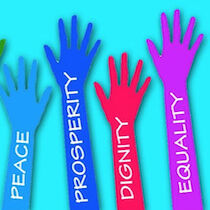Health
Psychological Rights: A New Concept in Mental Health
Three sets of rights that contribute to mental and emotional well-being.
Posted August 3, 2021 Reviewed by Kaja Perina
Key points
- A "Psychological Bill of Rights" is original, adding to classical definitions of other "rights."
- A government exists to create, modify and enforce all types of rights, but tends to fail when it comes to psychological rights.
- The idea of "human" rights has a long history in theology and moral philosophy differentiating us from the "lower" animals.
- Although you have numerous psychological rights, you may not be fully aware of them, and ignorance of these rights causes problems in living.

The Homo sapiens genome has changed 1% in the last 200,000 years. Still, our outstanding ability to "discriminate" nuances among the same species is extraordinary, creating the highs and lows of the Anthropocene or Human Age or the impact our species has on the planet and civilization.
People are people.
However, many do not think or act as if this is true, causing consternation, grievances, and conflict. If you are born a human being, and through political and moral actions, you have three rights: natural, human, and (now) psychological.
All three rights must be in coexistence and synchronization for the contented life and optimal well-being. In a utopia, psychotherapists would have an empty schedule book, but this is not the case.
Why a human being has more rights than any other species.
Natural rights entitle you to exist and survive. Human rights are more subtle, often a factor in political activity.
The establishment of human and natural rights is established as ambiguous social constructs (the powerful just make things up to remain in power), forcing the creation of tribes, and media and cyberspace ideological echo chambers reinforcing dubious superiority claims among the the genome. This discrimination drives the history of history, and the rise and fall of civilizations.
Ignorance of your rights causes psychological problems.
In practice, the violation of all rights causes psychological harm, which can be cured by enlightened societies through systems of justice. In theory, justice is an ethical, moral philosophy. In practice, most civil rights were established through "movements" and blood on the street.
Most of my clients feel some psychological right was abused or ignored, independent of their natural or human rights. This is the "life is unfair" argument, and it is.
Humans naturally establish social hierarchies based on acquired cultural roles.
Place 100 strangers in a closed room, and a social hierarchy based on the definition of that culture of right will form. NASA has to keep this natural hierarchical tendency in mind in future planet colonization and the composition of the crew. The failure to appreciate or understand rights also culminates in abnormal psychology placing great demands on a person's mental health.
Removing a right makes you aware you had it in the first place.
It is easier to remove a right than gain a right, so once a right is established, it must be preserved, and often preservation requires heroes and sacrifice starting "movements" to expand upon the right or sustain it.
What are the 68 new (and controversial) "Psychological Bill of Rights?"
Psychological Rights 1-12
You have the right to worship your own God. You have the right to be a secular humanist. You have the right to take it easy once in a while. You have the right to say, "No." You have the right to say, "Yes."
You have the right to work hard towards a worthy goal. You have the right to creative ambitions. You have the right to feel sorry for yourself.
You have the right to fail. You have the right to succeed. You have the right to be moody. You have the right to change your mind.
Psychological Rights 13-25
You have the right not to give a damn. You have the right to use your imagination. You have the right to be different. You have the right for others to know your opinion. You have the right to daydream.
You have the right to tune some people out. You have the right to change the world. You have the right to laugh.
You have a right to champion a cause. You have the right to choose your own friends and alliances. You have the right not to be jerked around. You have the right to ask for a raise. You have the right to live where you want.
Psychological Rights 26-41
You have the right to self-reliance. You have the right to change someone's mind. You have the right to disagree with experts. You have the right to not be overly influenced by the times or a mob. You have the right to live offline.
You have the right to be sad. You have the right to be lazy. You have the right to be jealous. You have the right to mess up. You have the right to harbor grudges. You have the right to be anxious and depressed.
You have the right to be hostile and in rage.
You have the right not to care. You have a right to defend yourself. You have the right to demand from elected officials the execution of their oath of office.
Psychological Rights 42-53
You have the right to access knowledge. You have the right to be impatient. You have the right to be an iconoclast. You have the right to clean air, clean water, and safe food. You have a right to believe in and act upon the tenants of your moral conscience.
You have the right to live with dignity. You have the right to access excellent health care. You have the right to control your fate and destiny. You have the right to complain when not treated with respect.
You have the right to peace of mind. You have the right to privacy. You have the right to a good education at a fair price.
Psychological Rights 54-68
You have the right to express a need for pleasure. You have the right to be treated fairly and humanly. You have the right to express your opinions. You have the right to have a fulfilling relationship. You have the right to a sense of security.
You have the right to be loved and to love. You have the right to speak truth to power. You have the right to have the same access and opportunities as any other person. You have the right to cry and to suffer in pain.
You have the right to own your body. You have the right not to be bullied. You have the right to seek justice when wronged. You have additional rights not listed here. Either you understand these rights or suffer the consequences. You also have the right to question these rights. Your physical welfare and mental health depend upon it.
Being naive or uninformed about your psychological rights often culminates in abnormal psychology and self-defeating behavior.
Your rights are hierarchical. To have human rights, your natural rights and human rights must first be satisfied. The icing on this cake is psychological rights. A nation-state, geographical space, is a nation-state since the citizens generally agree on the validity of these rights. However, cyberspace is a dystopia since cross-cultural psychology competes with the local social constructs, cultures, and ways.
How remaining unaware of your psychological rights affects contentment.
Many psychological diagnoses culminate in a failure to know or to use these now codified psychological rights causing reactive depression or learned helplessness––not doing––since you anticipate a negative outcome. The therapist's role is to change your mind about expectations and become free and autonomous, no easy task.




